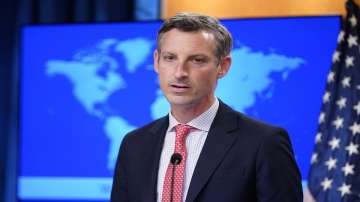Bilawal Bhutto controversy: US says India, Pakistan should engage in constructive dialogue
The United States said each of these relationships is indispensable to America and to the promotion and pursuit of the shared goals that the US has with India and Pakistan.

Bilawal Bhutto controversy: Amid the "war of words" between India and Pakistan, a top US official said that America always wanted that both countries should engage in constructive dialogue for the betterment of their people. Notably, relations between India and Pakistan have often been strained over the Kashmir issue and cross-border terrorism emanating from Pakistan. Recently, the tension escalated further following a war of words between foreign ministers of both countries.
While addressing a press conference on Monday, US State Department spokesperson Ned Price said America shares multifaceted relationships between India and Pakistan and therefore it wants both nations to start a "fruitful dialogue" so that the citizens can lead a progressive life. “We have a global strategic partnership with India. I have also spoken about the deep partnership we have with Pakistan. These relationships in our mind are not zero-sum. We do not view them in relation to one another,” Price told reporters.
It is worth noting that Price was replying to the controversial statement of Pakistan foreign Minister Bilawal Bhutto Zardari wherein he attacked Prime Minister Narendra Modi personally and called him "butchers of Gujarat"-- a term used for the accused in 2002 Gujarat communal riots.
Price said each of these relationships is indispensable to the US and to the promotion and pursuit of the shared goals that the US has with India and Pakistan. “The fact that we have partnerships with both countries leaves us not wanting to see a war of words between India and Pakistan. We would like to see a constructive dialogue between India and Pakistan. We think that is for the betterment of the Pakistani and Indian people. There is much work that we can do together bilaterally,” Price said in response to the question.
“There are differences that, of course, need to be addressed between India and Pakistan. The United States stands ready to assist as a partner to both,” he asserted.
What leads to the uproar in India
During a presser in New York, the Pakistani FM alleged that the then Chief Minister of Gujarat was involved in the communal riots that killed thousands of people in 2002. Although a court in Gujarat confirmed a committee set up by the Supreme Court did not find any evidence against Modi and 57 others, Bhutto claimed his alleged involvement in the riots claimed the lives of thousands. This resulted in massive protests in several parts of India including in Gujarat, Jammu and Kashmir, Delhi, Karnataka, Uttar Pradesh and others.
My comments were based on history, says Bhutto
Meanwhile, replying to the massive protests against him, Bhutto claimed that the "Indian Muslims have been facing unrelenting discrimination and hatred" and they should protest against them. Further, he opined that his comments were based on history and added it was difficult to alter history according to one's likes and dislikes.
"My comments were based on history, and it is difficult to distort history. You cannot rewrite history to suit your likes and dislikes," Pakistani media Dawn quoted Bhutto as saying when asked about the BJP’s protests against him. "I did not coin the term Butcher of Gujarat, Indian citizens gave this title to him. So, no matter how much you protest, you cannot change facts," he added. He maintained that the Indian government has been promoting hatred against Muslims in India and added they should protest against the discrimination, "instead of targetting him".
India reacts to Bhutto's baseless claims
It is worth mentioning India, on several occasions, exposed Islamabad for spreading terrorism in Jammu and Kashmir and other regions of the world. During his speeches at the UN forum, External Affairs Minister S Jaishankar highlighted how even the Pakistan intelligence agency, ISI, was involved in the brutal attack in Mumbai.
Like earlier, this time too, India responded sharply to the comments made by the Pakistani foreign minister and said, “These comments are a new low, even for Pakistan." "The Foreign Minister of Pakistan has obviously forgotten this day in 1971, which was a direct result of the genocide unleashed by Pakistani rulers against ethnic Bengalis and Hindus. Unfortunately, Pakistan does not seem to have changed much in the treatment of its minorities. It certainly lacks credentials to cast aspersions at India,” added the statement released by the Foreign Ministry.